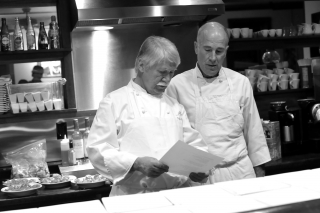
Teaching Through Storytelling
28 February 2022Transition from delivering information to building a learning environment.
By Paul Sorgule, MS, AAC
Feedback & comments: This email address is being protected from spambots. You need JavaScript enabled to view it.
There are certain teaching aspects unique to the culinary profession and important to learn if we are to be successful at what we do: building effective syllabi and lesson plans, measuring student learning, creating successful classroom management techniques, etc. However, a strong foundation in the process of operating a classroom will be less effective without the experience of being a chef as a vehicle for packaging and delivering all the technique information.
There is a significant difference between delivering material and actual teaching. That difference lies in the authenticity we offer, in other words how students connect what is offered with how we have personally experienced it. The stories we tell relay to our students the topic’s importance, the specific material’s relevance, and how to connect to those real-life examples. This is the reason many business schools rely on case studies to help students fully grasp what is being offered and how they might apply true learning. A teacher is most effective when he or she wraps a lesson in a personal story.
Bill Buford of the New York Times and author of the terrific book “Heat,” told a story about learning how to work in a professional kitchen:
“Stories are a fundamental unit of knowledge, the foundation of memory, essential to the way we make sense of our lives: the beginning, middle and end of our personal and collective trajectories. It is possible that narrative is as important to writing as the human body is to representational painting. We have returned to narratives - in many fields of knowledge - because it is impossible to live without them.”
Our students, or for that matter any student of life, remember stories far longer than if the essential message was simply delivered as “material to know.” When we sculpt our classroom around a personal experience, how that essential message impacted each of us, how we acted on that message, and what the results were (good, bad, or ugly), then a student’s attention is peaked and the message is stored for future access.
As chefs, every experience we have can be formatted into a story, one highlighting a teaching moment. Why is mise en place so important? Tell the story of a time when your lack of personal organization led to chaos on a busy kitchen line. Why are inventory controls, recipe costing and portioning so important? Address those times when, as a chef, your food cost was way out of line and looking back to inventory patterns or sudden increases in product cost allowed you to find the source of the problem and make the necessary corrections. Why is the management of the food danger zone and the elimination of cross contamination in food production so important? Talk about a restaurant where an outbreak of food poisoning resulted in an “out of business” sign in the window and many guests seriously ill. It will always be the stories that emphasize the importance of a topic.
There is a relevant Native American proverb that relates to storytelling and true learning:
“Tell me the facts and I’ll learn. Tell me the truth and I’ll believe. But tell me a story and it will live in my heart forever.”
Every chef has a portfolio of stories, tales of the diverse players with whom they have worked, the impossible situations they clawed their way out of, the customer who was unreasonable and beyond comforting, the vendor who was disappointed, the farmer who loved his work, and that special food plate that defined his or her brand as a cook. Tell those stories, make them an essential part of your teaching, become the teacher students clamor to listen to and know that it will be those stories that make a difference in a person’s life and career. This is what they will remember, this is how we transition from delivering information to building a learning environment.
“There are two ways to share knowledge. You can push information out. You can pull them in with a story.” – Unknown
PLAN BETTER – TRAIN HARDER
Paul Sorgule, MS, AAC, president of Harvest America Ventures, a mobile restaurant incubator based in Saranac Lake, N.Y., is the former vice president of New England Culinary Institute and a former dean at Paul Smith’s College. Contact him at This email address is being protected from spambots. You need JavaScript enabled to view it..
